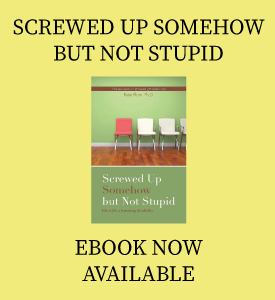This post stems from a conversation I (@Nonverballd) had on Twitter with @spectrum_life. It’s about how to find the strength to not let bullies get you down. Bullies prey on the weak and defenseless. That is their nature. All too often, we with disabilities, we in the autism ballpark are weak; we become the victims of bullies. Sometimes this bullying is physical. That bullying is very real, and I have no desire to minimize it, but it is at least somewhat easier to report to authorities (whether school administration or the police) than is psychological bullying. After all, if someone hits you, that is a crime. Someone making fun of you is not.
Psychological bullying is more subtle. Indeed, those of us in the ballpark may have particular difficulty recognizing it and then reporting it in ways that make sense to the person we are talking to. The psychological bullying can also occur like a slow water drip, with each drip being insignificant but the overall effect intolerable. Then when we report that last drip, that drip that makes us freak out, it sounds like we are complaining over trifles.
The best way to deal with psychological bullying is to avoid it in the first place; but being disabled isn’t a choice. No one asked us, as newborns “Hey, how about some autism?” or “Would you like to be dyslexic?” and certainly we didn’t check a box saying “Yes, please”. We are as we are. But another way to resist psychological bullying is to be unaffected by it. Bullies want a reaction. This is the “ignore them and they will go away” school. But it’s not so easy as that makes it sound.
Eleanor Roosevelt once said “no one can make you feel inferior without your consent”. But it takes strength to refuse that consent. Some of that strength may come at birth – people are different even as newborns. Some may come from our early experiences as children. We have no control over those. How can we find strength if we were not so lucky as to be born or raised to have it?
It isn’t easy. But here are some ideas.
One is to form friendships. This is hard for many of us. Not only are some of us inept at friendship, but trying to become friends is an opportunity to be rejected. It’s scary! But we are at much greater risk if we try to be friends with the popular kids. Those kids don’t need us. In fact, they can confirm their popularity, their membership in the in-group, by rejecting others. But what about other unpopular kids? A model here could be the movie “Revenge of the nerds”. Because one of the defining characteristics of the in-group is that it is small. It has to be.
It may also be possible to form friendships with people who are not your age-peers, especially if you are in that hell called middle school. Seek some help from a trusted adult (a parent, a teacher, a friend of one of your parents … ). Some adults will willingly be friends with kids who share their interests or whom they find interesting, but there are also adults who will prey on kids (and those adults are often good at hiding).
Finding an interest outside or inside school can be a source of strength. A talent, even a relatively minor one, can be as well. I wrote about juggling for the special needs child (or adult) but the skill could be anything. These interests can also be a source of friends.
I am sure there are other sources of strength. What are yours?



Speak Your Mind